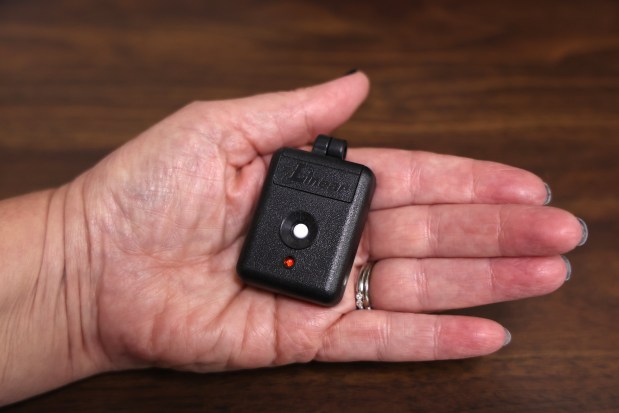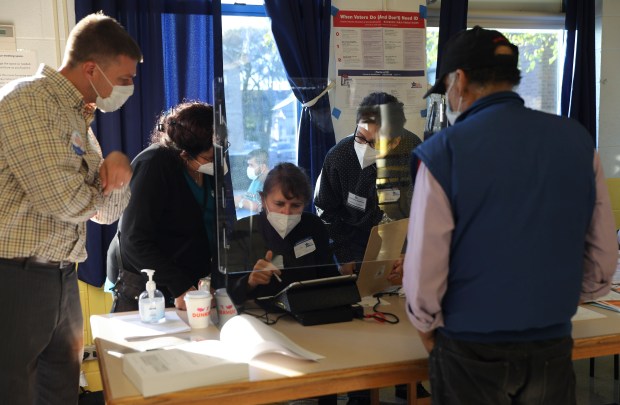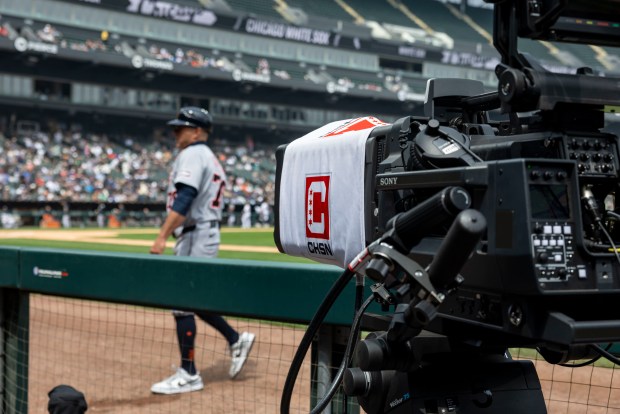The roughly 100 men and women who oversee elections in Illinois — both Democrats and Republicans — have launched a voter integrity campaign to help debunk falsehoods being fed in large part by lies from former President Donald Trump and his allies that the 2020 election was stolen.
But even as the elections officials open their offices for tours and make themselves available for questions about the voting process and the equipment they are using to count ballots for the Nov. 5 election, the head of their state association said he is considering purchasing body armor amid fears the conspiracy theories will turn physical.
The efforts to be both more transparent about the election process while also keeping a keener eye on safety comes during one of the most polarized political times in American politics and as misinformation has taken hold in corners throughout the nation.
The Illinois Association of County Clerks and Recorders, the organization representing the top elections officials in most locations, said in a recent statement that a “secure nonviolent democracy is only possible when the citizens have faith in the results of fair, free elections” and the group acknowledged misinformation has been allowed to germinate in part because voting and ballot counting have been more opaque than they could have been.
“The ability to visit our offices, ask us questions, express your concerns and see for yourself how the election process works has always been available from us, the local individuals responsible for this activity here in the State of Illinois,” the association statement continued. “If in the past this was not well communicated and you the citizens did not feel we welcomed your inquiries, we want that to change and we want you to know we want to talk with you!”
Democratic Attorney General Kwame Raoul also has issued a short “voter misinformation” guide, saying that “while election misinformation efforts are concerning, we can be reassured by the fact that thousands of elections officials and volunteers work hard and with integrity to keep our elections free and fair.”
And the Illinois State Board of Elections has stepped up with its first-ever airing of public service announcements on TV and radio to combat misinformation while raising its presence on social media to try to curb the spread of election untruths. It also has an online “scam alert mis/disinformation form” for voters to report false or distorted reports involving voting procedures.
Elections officials from both political parties have initiated their own efforts. Democrats have what they call “ballot protection” efforts, including creating a hotline to help voters if they face hurdles in casting a ballot. Republicans are focused on recruiting election judges and poll watchers for what it calls its “election integrity” program. But the state GOP also continues to rely on 2020 election deniers to offer training.
Trump, the Republican nominee for president, has continued to falsely insist his 2020 loss to President Joe Biden was stolen from him due to fraud. That’s even though more than 60 court cases across the country challenging election results were rejected by judges, including some appointed by Trump to the federal bench.
The former president also has been setting the stage for potential challenges should he lose to Democratic Vice President Kamala Harris. In a Sept. 27 visit to Michigan, Trump told the crowd, “If I lose — I’ll tell you what, it’s possible. Because they cheat. That’s the only way we’re gonna lose, because they cheat.”
Trump has long claimed, without evidence, that early voting and voting by mail has been corrupted. Just last month in Pennsylvania he said the lag time between when an early vote is cast and when it’s counted on Election Day allows for votes to be manipulated.
But there is no proof that early or mailed ballots, which are stored in secure locations, were tampered with in 2020. And despite Trump’s verbiage, he has voted early himself and he and other Republicans have still encouraged supporters to either vote early or by mail for this election.
In addition to expressing disdain for early voting and voting by mail, Trump also has contended, without evidence, that Democrats were registering noncitizens to vote, including in a fundraising email to supporters last week that said “TENS OF THOUSANDS” of such registrations had already occurred. Trump also made the allegation in the Sept. 10 presidential debate and Trump supporter Elon Musk has fueled the conspiracy theory by saying Democrats are “importing voters” so they can create a “one-party state,” CNN reported.
But claims of noncitizen voting are misleading and experts note noncitizens are unlikely to risk being apprehended or imprisoned just so they can register to vote. The Brennan Center in a study of voting in 2016 found that out of 23.5 million votes cast in 42 sample jurisdictions, there were 30 instances of suspected noncitizen voting or 0.0001% of the votes cast.
Scott Erickson, a Republican who has been the Knox County clerk in Galesburg for 20 years, is the head of the state’s county clerk’s association. He said the group felt a need to speak out and open its doors to voters in the wake of the continued spread of falsehoods about election systems.
“I know that my fellow clerks work hard and we all work hard to make sure that those elections are smooth, and we take pride in the fact that we are able to conduct these elections in a nonpartisan way in a very partisan world,” Erickson said.
“As a group, we’re speaking with one voice — Republicans, Democrats, independents and otherwise — we are working for you,” he said. “We’re looking out for your best interest, and we here in Illinois are working hard to make sure that those elections are safe and smooth for you, because that’s what we do.”
Erickson said he’s encountered people who “get ginned up on a particular topic” such as “the elections are rigged, the elections are fake, my votes don’t count and the like.”
“That’s so far from the truth that it’s not even funny,” he said. “But you’re still going to get those few that are just bent on not understanding or not believing what we’re telling them. And it’s hard to get through to those people that have just gone so far past the understanding piece of it.”
But Erickson noted the political divisions and rhetoric has escalated into violence, pointing to the assassination attempt on Trump in July and an apparent Trump assassination plot last month. And he said he fears it could translate to local elections officials, including himself.
“How do we protect ourselves? How do I protect my staff and team to make sure that none of them get hurt?” he asked. “I’ve even considered trying to look at getting body armor for myself, just in case.
“It’s crazy that I should be having to think about personal protection and always looking over your shoulder and making sure that you’re in a safe area when I should be focusing all my energies on elections and making sure that everything is running smoothly and operationally,” he said.
The “energized and polarized” environment has made it harder for clerks to get election judges and poll watchers, he said, particularly among older people who have traditionally filled such roles, because they don’t want to deal with potentially angry voters at the polls. He said he has told the judges that if they don’t feel comfortable handling a ruckus at the polling place, “You call me and I will bring the cavalry with me. We’ll take care of you.”
Clerks, themselves, have had a large turnover — about one-third have changed in the last few years, he said — though it is difficult to say how much the political environment has contributed.
Erickson said elections officials have “moved up in the threat matrix for physical and cyber security issues” and are on the “Homeland Security radar.” Four years ago, Boone County installed panic buttons in the clerk’s office as a precaution.

State elections officials have distributed grants to make clerks offices more secure, such as redesigned and locked office spaces where election counting machinery is used.
“We pray that nothing does happen, not only in Illinois but across the country, that no elected officials are threatened or attacked in any sort of way because we all are doing that same job. But it’s scary. It’s kind of crazy, we’d have to think of these things,” Erickson said. “Is there fentanyl? Is there anthrax? Is there any of this crazy stuff that’s going around that someone’s putting into the mail system, or someone just trying to dump fluids into our ballot box drop boxes? You think, ‘Oh, that’s just crazy. We never have to worry about that.’ That has now become somewhat of a reality that you’ve got to consider, and at least prepare for.”
Two weeks ago, the Illinois State Board of Elections was among several state elections offices in the U.S. that received suspicious letters containing a powdery substance. The Illinois letter came later than other states and officials were prepared.
“We knew it was going to be coming, so we were on the lookout for anything that looks suspicious,” board spokesman Matt Dietrich said. The return address of the envelope said USTEA — an acronym for United States Traitor Enforcement Army.
“That was a dead giveaway. So we called the federal partners with DHS, and then the FBI came and took possession, did a field test on it and it was nothing harmful,” he said. Still, the board’s Springfield offices were evacuated as a precaution. The board offices, as a precaution, also have available Narcan, the overdose-reversal drug naloxone, should letters laced with fentanyl be opened.
In public service announcements distributed to television and radio stations statewide in conjunction with the Illinois Broadcasters Association, the state elections board also is warning that “disinformation can be dangerous to democracy.”
“Don’t fall for election disinformation you may see on social media. If you see something on social media, check it out and contact your local or state elections official for the most accurate and honest information. Don’t get fooled,” one TV announcement says.
A Spanish language announcement lets voters know that if they have questions about being bombarded by “stuff about the election” via social media or in the mail, “state or local voting authorities can help you find the answers when you need them the most.”
Dietrich also said the board has engaged often on social media with postings specifically designed to address issues that people get wrong — intentionally or unintentionally — or to correct something that officials have seen. Over the summer, he said, a special focus was placed on the issue of noncitizen voting, which included posts on X, formerly known as Twitter, as well as a video on YouTube to counter “the idea that noncitizens are registering to vote en masse in Illinois.”
“It’s crucial to maintain the integrity of our voting system. Noncitizens are prevented from registering to vote at the DMV through various safeguards, including specific programming that identifies citizenship status,” read one board post on X. Another X post said, “Voting by mail and using drop boxes are safe and secure methods to cast your ballot. In fact, voter fraud in these processes is so rare that you’re more likely to be struck by lightning!”
“It’s a real judgment call on what to address,” Dietrich said. “Are we just going to amplify their (disinformation/misinformation) message or is this a case where it’s gotten so much traction that we have to engage with them and try to correct it?”
Raoul, the attorney general, issued his voter guide that contains a heavy emphasis on warning of AI-generated fake audio and photos on social media. But he also urged voter caution on any postings that “elicit a strong emotional reaction.”
“If you see incendiary, sensational or surprising content about the elections or candidates, be especially cautious. Check to see if the information is being reported by legitimate news outlets or being shared by the subject of the post or the supposed source of the information,” Raoul said.
Raoul also is issuing a caution beyond politics, noting that typical tactics used by scammers may be disguised as communication about campaigns or the election and that links from unsolicited text messages or emails could lead to identity theft or financial fraud.
While the state GOP is heavily promoting a “swamp the vote” program to encourage Republicans who largely vote on Election Day to cast an early ballot, they also have an “election integrity” program that relies on people who have pushed Trump’s 2020 election falsehood.
On Saturday, state GOP Chair Kathy Salvi was the featured speaker at the Republican Women of Park Ridge’s 2024 Red, White & Blue Brunch fundraiser along with Carol Davis, the chair of the Illinois Conservative Union and a self-professed election integrity expert.
Davis has contended “there is fraud in every election in this country.” She has expressed disappointment that a cold kept her away from the “Stop the Steal” rally in Washington, D.C., that led to the deadly riot by Trump supporters at the U.S. Capitol on Jan. 6, 2021. She has questioned the integrity of election machinery. And she said vote-by-mail ballots are susceptible to fraud and are part of a Democratic plot to do away with in-person voting.
Davis also said the 2020 presidential election was “absolutely not” free and honest and she cheered on Trump’s legal challenges that ultimately proved unsuccessful.
Davis has said she is a friend and speaks regularly with Cleta Mitchell, one of Trump’s post-election attorneys who unsuccessfully tried to overturn election results in several states. Mitchell was on an infamous phone call Trump made to Georgia Secretary of State Brad Raffensperger in which Trump asked him to find 11,780 votes. A Fulton County, Georgia, grand jury recommended that she be charged in the sweeping indictment against Trump and 18 of his allies and co-conspirators, but she was not included.
Mitchell also leads the Only Citizens Vote Coalition, which has been pushing the Trump falsehood of noncitizen voting, a subject Davis also has adopted.
Salvi, in a GOP chairman’s memo emailed to Republicans on Thursday, also promoted “training” for poll watchers and others that was being offered by the Moline-based Illinois Freedom Alliance.
The far-right group lists as its “election integrity” goals a ban on all electronic elections equipment, early voting and voting by mail. Its website features an “analysis” of the 2020 election and concludes voting in Chicago, Cook County and the collar counties was “obviously rigged” and was “likely rigged” in some downstate counties with a sizable Democratic turnout. There was no explanation offered for the analysis’ conclusion.
The Illinois Freedom Alliance also features several conspiracy theories, including those involving election fraud backed by Mike Lindell, the widely discredited My Pillow founder and Trump supporter.
And for the Nov. 5 election, it urges “No” votes on three nonbinding advisory referenda, including one proposing civil penalties against a candidate who interferes with an election worker. The group’s explanation makes clear it does not understand the referenda issues are advisory only and would not become law as a result of the voting.
Erickson, the Knox County clerk, said resolving voters’ election concerns comes down to trust.
“The world is built on trust. You’ve got to trust people. You’ve got to trust that the dollar bills you’ve got in your wallet are going to be cashed and be able to be used to buy groceries at the grocery store or buy gas at the gas station. You’ve got to trust that your doctor knows what they’re doing when they say that you need to take this medicine. It kind of falls in the same way with us. You’ve got to trust us that we’re running these elections smoothly,” Erickson said.




